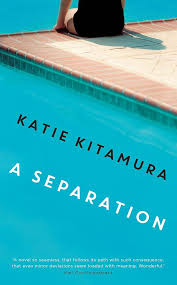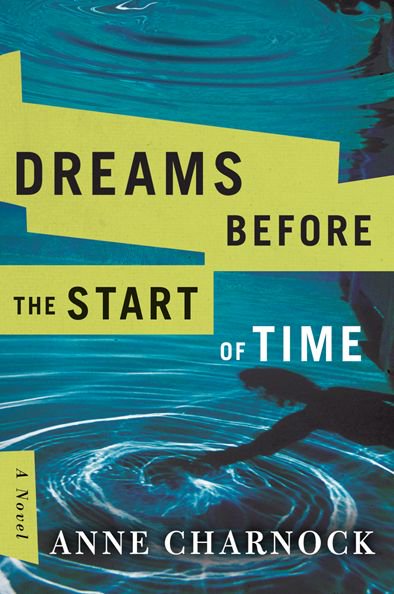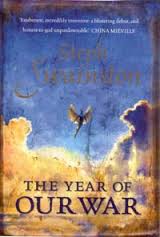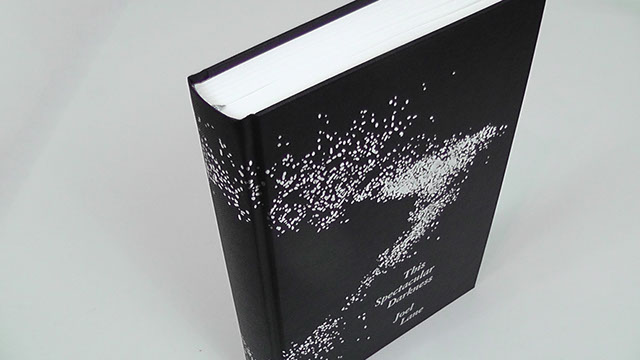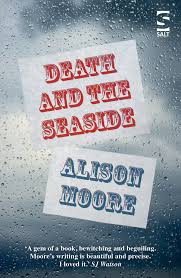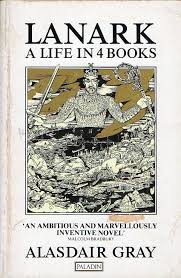 “What’s worth saying, three decades on, is that Lanark , in common with all great books, is still, and always will be, an act of resistance. It is part of the system of whispers and sedition and direct communion, one voice to another, we call literature. Its bravery in finding voice, in encouraging the enormous power of public, national, artistic, sexual and political imagination, is not something to take for granted.”
“What’s worth saying, three decades on, is that Lanark , in common with all great books, is still, and always will be, an act of resistance. It is part of the system of whispers and sedition and direct communion, one voice to another, we call literature. Its bravery in finding voice, in encouraging the enormous power of public, national, artistic, sexual and political imagination, is not something to take for granted.”
(Janice Galloway, ‘Glasgow Belongs to Us‘, The Guardian 2002)
In the Epilogue to Lanark, which can be found somewhere towards the latter quarter of this behemoth text, Gray directly references both Orwell’s 1984 and Koestler’s Darkness at Noon – ‘mostly conversations between disappointed Socialists’ – as key influences upon the novel. As Darkness at Noon, which I read at least four times between the ages of fifteen and twenty-one, was the work that most influenced me away from dogmatic socialism, and 1984, which I read for the first time probably in the very same year I first read Darkness at Noon, was one of the key works that introduced me to the vast radical intellectual potential of science fiction, Gray’s direct-to-reader irruption into his own novel raised more than a frisson of fellow feeling.
Lanark is so much more than this, though – so much more than excited underlining of key passages and thinking bloody hell, this could have been written yesterday. Interwoven with and inseparable from the blistering political commentary on our own times – and yes, Lanark truly is so prescient, so relevant to today’s political crisis it feels newly minted – are passages of such emotional and imaginative power they raise the whole from the merely important to the truly great.
I loved this book. Lanark is the kind of novel one emerges from with a renewed and evangelical appreciation of what writing is for.
*
In his engaging and candid introduction to the twenty-fifth anniversary edition of Lanark, the novelist William Boyd describes his first encounter with the monster – he was commissioned to review it for the TLS when it was first published – and recalls his confusion regarding the novel’s fantastical elements:
“I know now why I didn’t respond with wholehearted enthusiasm to the allegorical story of Lanark in the city of Unthank. I was positioning myself, as all writers unconsciously do – and particularly as a first novelist whose first novel had just been published — using criticism of others to evaluate and proclaim what I myself stood for. I was and am a realistic novelist and I felt strongly then that fable, allegory, surrealism, fantasy, magic realism and the rest were not my literary cup of tea. But I think that in my 1981 review I unconsciously prefigured aspects of my recent, late reading of the book. The structure of Lanark – the small naturalistic novel embedded in a large eclectic one – is, it seems to me now, precisely the reason for the book’s enduring success. I realize now that, for Alasdair Gray, the last thing on earth he wanted to achieve in Lanark was to write, and be hailed for writing, ‘a minor classic of the literature of adolescence’…[That] could never have been enough: every ambition that Gray had for his long-gestating book obliged him to create something larger, more complex, more difficult, more alienating. Gray needed the overarching machinery of allegory and fable to make Lanark transcend its origins.”
A fair enough analysis, one might think, and at least experience has brought Boyd a deeper understanding of Gray’s intentions. Yet – like so many writers and critics who disdain the fantastic or at the least entertain grave suspicions about its fitness to be included within the canon of ‘great literature’ – we still see Boyd stumbling about, stubbing his toe on concepts such as ‘allegory’ and ‘fable’, reminding us in the process of much of the inept debate that attended the publication of Kazuo Ishiguro’s The Buried Giant just a year or two ago.
Personally, I think it’s a mistake to view Lanark in terms of it being split into two ‘realistic’ books and two ‘science fiction’ books. The point and the glory of Lanark – and of much of the greatest science fiction – is that the two are inseparable. One of the most powerful passages in the entire novel – Duncan Thaw’s descent into madness at the end of the ‘realistic’, Glasgow-set Book 4 – bleeds seamlessly into the wire and workings of the nightmarish dystopia of Glasgow’s shadow-self, the city of Unthank. Thaw is Lanark, Lanark Thaw. There is little to be gained in seeking to pigeonhole them and certainly not clarity. Towards the end of this sequence, Glasgow begins to morph very visibly into Unthank: the scant trickle of river, the towering municipal building, the ‘tomb-rotten pile’ of the necropolis:
He remembered a stone-built city of dark tenements and ornate public buildings, a city with a square street plan and electric tramcars…but below a starless sky this city was coldly blazing. Slim poles as tall as the spire cast white light upon the lanes and looping bridges of another vast motorway. On each side shone glass and concrete towers over twenty floors high with lights on top to ward off aeroplanes. Yet this was Unthank, though the old streets between towers and motor lanes had a half-erased look, and blank gables stood behind spaces cleared for car parks.
There is a sense of utter desolation and loss, the sense of life and creative freedom slipping away under the foul iron hand of central planning, monetary imperatives, coercive control. When talks are prepared and essays are written about the key works of social science fiction written in Britain over the past hundred years – works that have come to define our science fiction century – we are all used to hearing about Brave New World and 1984, Lord of the Flies and The Island of Dr Moreau. We are less used to hearing about Lanark. which seems to me to be a dire and almost laughable oversight. Lanark is a towering achievement in terms of its creative expression, its social comment but also its science fiction. Gray seizes the levers of science fiction with an uncanny natural ability, driving the machine forward with instinct and purpose. Gray is no science fiction tourist. He makes himself a part of the conversation not by covertly seeking admittance but by barrelling into the room and raising a storm. His science fiction feels intense and sophisticated – a polemic in the European tradition of argument-making and ideas-formation – and yet at the same time urgent, rough-hewn, so raw it is bloody.
*
Again and again, Duncan/Lanark finds himself crushed beneath the absolute incompatibility of creativity and capitalism, freedom of thought and the money-making impulse. At its heart, Lanark is a portrait of the artist as a young man – another of the key texts referenced directly by Gray in his crafty (and very funny – Lanark is funny, folks) Epilogue. As every serious artist before him, Duncan Thaw has first to win the trust and admiration of the system before rejecting it utterly:
“This exam is endangering an important painting. It would be blasphemy to waste my talent making frivolous decorations for a non-existent liner. But I see your difficulty. You must uphold the art school, while I am upholding art. The solution is simple. Do not award me this diploma. I promise not to feel offended. The diploma is useless, except to folk who want to be teachers.”
This realisation – that like every great artist he is essentially on his own in uncharted territory – is both exhilarating and terrifying. In one of my favourite passages in Lanark, Duncan Thaw feels furious with an art school assignment – ‘Washing Day’ – for being so tame, so lacking in relevance, that he is minded not to attempt it. Then he finds himself swept along, subverting the notion of quaintness in a stark, ecstatic expression of his own vision, his own Glasgow:
His pen paused above the page then descended and sketched the tree on Sauchiehall Lane, making it larger, and leafless, and among the tenements and back greens of Riddrie. Around it three dwarfish housewives were stretching ropes between iron clothes poles, and he drew them from a memory of a home help who had looked after the house while his mother was dying. They wore headscarves, men’s boots, and big aprons covered their chests and skirts giving them a sexless, surgical look. At the top of the picture the tree’s highest branch stuck into a strip of sky among the tenement chimneys. He remembered a Blake engraving of a grey ocean with an arm sticking out of a wave, the hand clutching at the empty sky. Another Blake engraving showed a tiny pair of lovers watching a small frenzied figure set foot on a ladder so thin and high that the top rested in the sickle of a moon. A caption said, “I want! I want!” Thaw drew a moon in the sky above the treetop.
*
Lanark is a simple and in some ways familiar story: a young boy growing up in Glasgow in the years after the second world war discovers he is unlike other boys, that he loves reading and painting. To the consternation of his parents and teachers, he refuses to let his creative ambition be defined by the demands of a system geared towards making money. Thaw goes to college and there begins to find friends who are at least partially of the same mind, though his continuing difficulties in forming relationships with the opposite sex, coupled with chronic illness and an obsessive, irascible temperament, combine to plunge him into a spiral of depression and poor physical health from which he fails ultimately to escape. Thaw dies tragically, in a kind of accidental suicide, and then seems to pass into a hell that proves to be nothing more than a starker, darker portrayal of the world he has left.
Is Unthank one of Duncan’s murals, a kind of John Martin-like vista of horror revealing the corruption and wrongheadedness of the contemporary political landscape? Is Unthank a warning – a doomsday scenario – or merely an accurate depiction of the world as we currently experience it? Alasdair Gray’s Lanark has been described as the novel that kickstarted the Scottish literary renaissance – James Kelman, Alan Warner, Janice Galloway and Irvine Welsh all cite him as a life-changing influence. Scotland’s makar, Jackie Kay, insists that it was meeting and talking with Alasdair Gray as a teenager that gave her the confidence to think of herself as ‘a writer’. We should also note that it was an Englishman and a science fiction writer – Anthony Burgess – who first hailed Lanark as ‘a shattering work of fiction in the modern idiom’.
Lanark is important to Scotland, important to science fiction, important to modernism. It is novels of of such passionate ambition that reinvigorate the whole idea of literature for a new generation. Some of them – Lanark, for example – will continue to do so, for one generation after another.
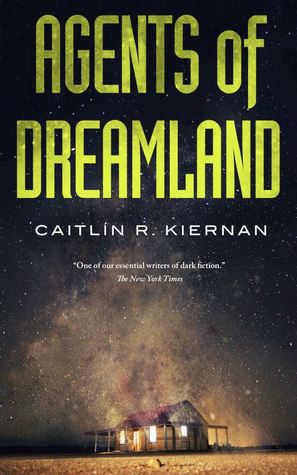 “The best foreshadowing never seems like foreshadowing.”
“The best foreshadowing never seems like foreshadowing.”